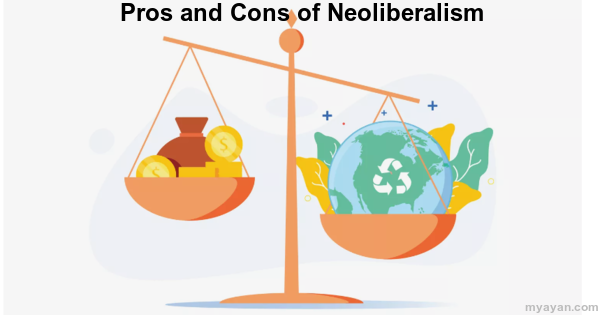Neoliberalism is often described as an economic theory that emphasizes the importance of individual liberty and free trade. It advocates for the creation of a market-based economy with minimal intervention by the government. This economic model has been adopted by many countries around the world, including the United States and the United Kingdom. While neoliberalism has its share of advantages, it also has some downsides. In this blog post, we will examine the pros and cons of neoliberalism with real-life examples. To understand the full impact of neoliberalism, it is important to look at both its pros and cons.
When Neoliberalism is in effect, governments place fewer restrictions on businesses and that's where proponents come to talk about the pros of neoliberalism. Some of them include:
The proponents of neoliberalism argue that this economic theory has the capacity to stimulate economic growth rates. For example, Portugal and Ireland increased their per capita income significantly after adopting neoliberal policies. Economic growth results in job creation, increased production, and a higher standard of living for citizens.
Neoliberal policies generally deregulate markets and industries, allowing for increased competition. This can give businesses more room to innovate and create new products or services, giving consumers more choice.
One of the main advantages of neoliberalism is that governments reduce the tax burden on individuals and companies. This leaves people with more disposable income, which can then be used to increase consumer spending and spur economic growth.
In a neoliberal system, workers are expected to be flexible and adaptable to changes in the market. This means people can relocate to areas with job opportunities, which often results in better pay and more varied work.
Neoliberal policies can also increase global integration and create more opportunities for individuals to pursue their dreams. For instance, increased trade can open up markets to new goods and services, allowing people to access products that were not previously available.
At the same time, there are numerous cons of neoliberalism which must be considered before embracing this economic theory. Some of the major cons include:
One of the most common criticisms of neoliberalism is that it increases income inequality by favoring wealthier individuals and corporations. This can often lead to an increased gap between the rich and poor, as well as making it more difficult for lower-income households to access basic services.
Another issue with neoliberalism is that it can create a great deal of uncertainty for businesses and individuals alike. Many policies are designed to promote competition and deregulate markets, which can lead to market volatility and instability.
Neoliberalism also has the potential to cause job losses as companies seek to reduce costs by cutting jobs. This can lead to a decrease in wages and job security, as well as making it more difficult for individuals to find gainful employment.
Neoliberal policies often prioritize economic growth over environmental protection, which can lead to increased pollution and damage to natural resources. This is particularly problematic in developing countries, where regulations are often weaker and environmental awareness is lower.
Neoliberalism can also lead to political instability as governments may be more likely to ignore public opinion in pursuit of economic growth. This can result in increased dissatisfaction with the government and potential unrest or unrest.
Neoliberalism has certainly had its fair share of pros and cons. Undeniably, it has accelerated global economic growth and generated wealth in countries around the world. Still, it also has significantly exacerbated the crisis of inequality and deprivation along with environmental damage. It is important to consider all these factors when studying the system.
Understanding the root causes of neoliberalism’s strengths and weaknesses can be quite eye-opening. This helps us make more informed decisions about public policy and better prepare for transitions if our current reality changes or shifts another direction entirely. Ultimately, learning more about neoliberalism is key for individuals to participate in meaningful dialogue on policies that directly affect them.

In contemporary usage, neoliberalism refers to reform policies that emphasize market orientation. These policies encompass various measures, including eliminating price controls, deregulating capital markets, and reducing trade barriers. Additionally, neoliberalism aims to diminish state influence in the economy, often achieved through privatization and austerity measures.
The neoliberal ideology has been associated with lower collective health and well-being levels. Interestingly, neoliberal beliefs promote self-efficacy, self-esteem, and self-reliance at the individual level. This suggests a complex relationship between neoliberalism and its impact on both societal and personal aspects of our lives.
Post-neoliberalism, alternatively referred to as anti-neoliberalism, encompasses a collection of ideals that signify its opposition to neoliberalism and the economic policies exemplified by the Washington Consensus.
What are the impacts of neoliberalism? The implementation of neoliberal policies on a global scale has resulted in various detrimental socioeconomic outcomes. These include an escalation in poverty levels, higher unemployment rates, a less productive workforce, and a deterioration of income distribution (Rotarou & Sakellariou, 2017; Collins et al., 2015).